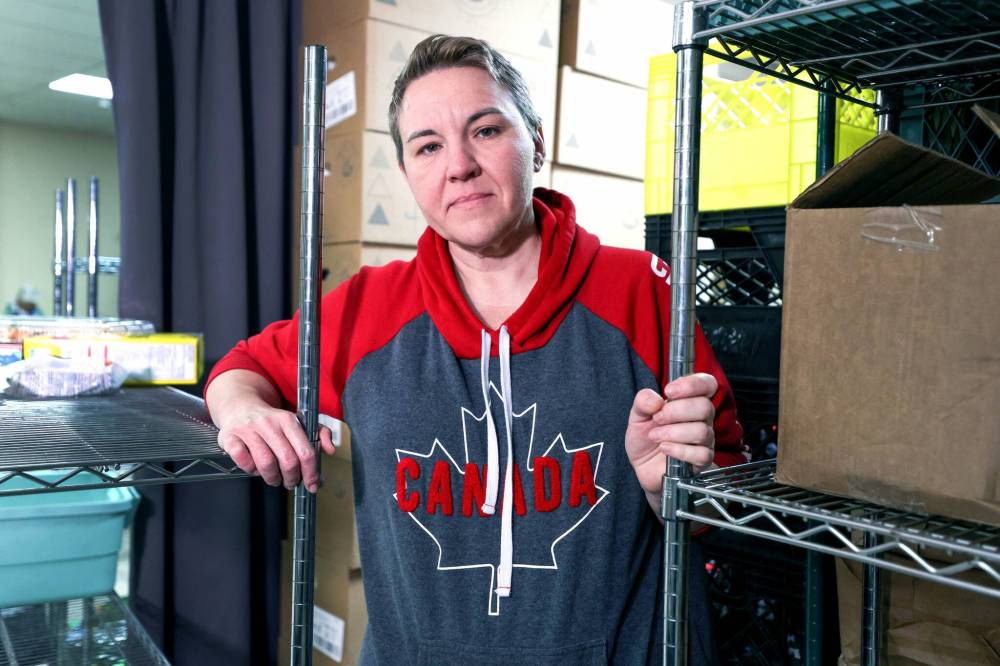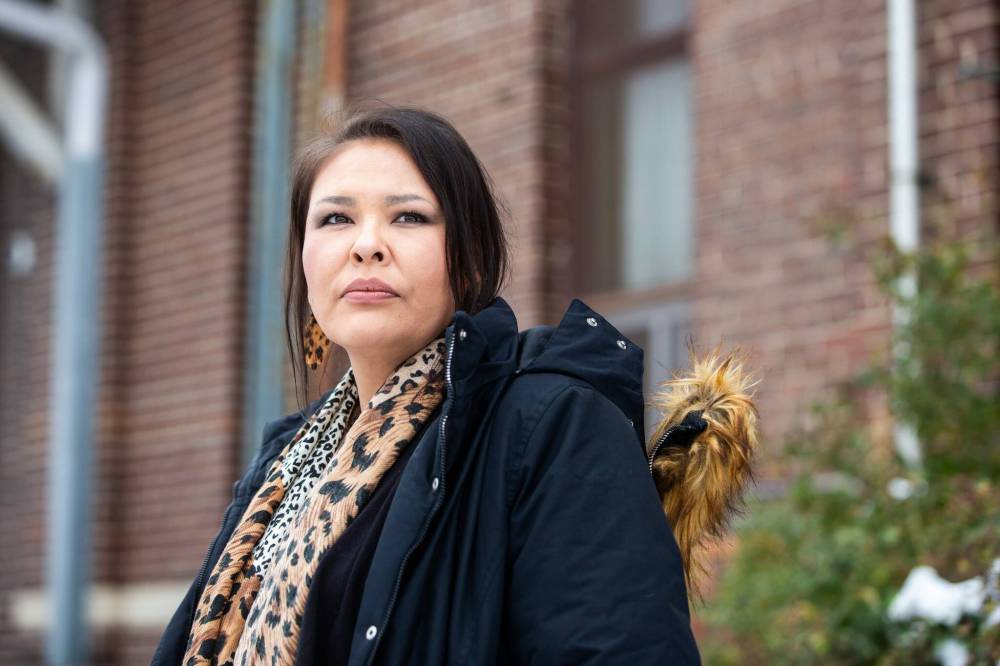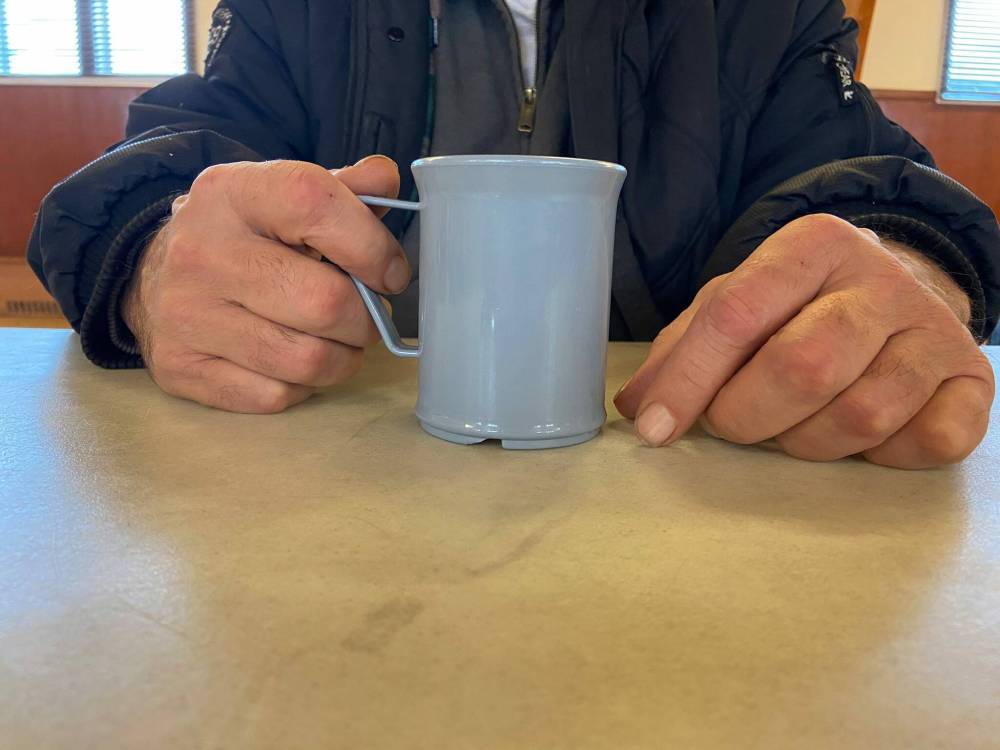The changing face of food banks Manitobans share their stories of struggle to feed themselves and their families
Read this article for free:
or
Already have an account? Log in here »
To continue reading, please subscribe:
Monthly Digital Subscription
$0 for the first 4 weeks*
- Enjoy unlimited reading on winnipegfreepress.com
- Read the E-Edition, our digital replica newspaper
- Access News Break, our award-winning app
- Play interactive puzzles
*No charge for 4 weeks then price increases to the regular rate of $19.00 plus GST every four weeks. Offer available to new and qualified returning subscribers only. Cancel any time.
Monthly Digital Subscription
$4.75/week*
- Enjoy unlimited reading on winnipegfreepress.com
- Read the E-Edition, our digital replica newspaper
- Access News Break, our award-winning app
- Play interactive puzzles
*Billed as $19 plus GST every four weeks. Cancel any time.
To continue reading, please subscribe:
Add Free Press access to your Brandon Sun subscription for only an additional
$1 for the first 4 weeks*
*Your next subscription payment will increase by $1.00 and you will be charged $16.99 plus GST for four weeks. After four weeks, your payment will increase to $23.99 plus GST every four weeks.
Read unlimited articles for free today:
or
Already have an account? Log in here »
Hey there, time traveller!
This article was published 05/11/2023 (766 days ago), so information in it may no longer be current.
Soaring inflation and stagnant wages that don’t come close to keeping up with the cost of living have pushed many Manitobans who once managed to keep their heads above water into the working-poor end of the pool.
And the people who were already there are now straining to even see the poverty line they once hoped to clear on their way to a better life.
That grim reality is in sharp focus for non-profit organizations on the front lines.
At Harvest Manitoba, one in four people getting help in 2022 had a job, a 50 per cent jump from the previous year.
“For many people that are in their working years, increasingly, in this country, we see wages not keeping up with the cost of living, whether it’s housing, interest rates, the price of food, the price of transportation,” says Vince Barletta, the food-bank network’s chief executive officer.
“And then, we also have many people that are getting squeezed between paying their bills, raising their kids, (and) in some cases, taking care of aging parents at the same time.”
It’s getting harder for many helping organizations to keep up with the level of need, particularly outside of the city.
For the people working at Our Daily Bread in Selkirk, there just are not enough nearby resources for neighbours who need a little extra help.
“We try and help them, but what can we do?” says mission co-chair Barbara Pasaur. “All you can do is you can say, ‘Get a ride to Winnipeg.’”
While some groups — Ukrainian refugees, newcomers to Canada, Indigenous Manitobans, people with disabilities, women and, increasingly, children — are over-represented among food bank users in the province there are now many others experiencing food insecurity.
Here are the stories of four Manitobans who are using food banks to fill in the gaps created by the crushing economic impact of post-pandemic inflation.
Kateryna Hostiminska, 48
The newcomer from Ukraine speaks with a positivity that belies the turmoil of the last six months of her life.
Originally from Odesa, a major seaport hub in Ukraine repeatedly attacked during Russia’s ongoing military invasion, she left her husband behind and fled with their 13-year-old daughter and 10-year-old son, hoping to find a better — and safer — life in Winnipeg.
Since Russian tanks crossed the border in February 2022, approximately 22,00 Ukrainian refugees have relocated here. All were automatically registered with local food banks, providing a crucial measure of security in Hostiminska’s case, particularly during her family’s first month here, before she was able to find a night job stocking shelves at a grocery store.
After studying in Slovakia, she was a child psychologist who helped young people with disabilities and worked with Ukraine’s ombudsman. She now makes minimum wage and uses Agape Table’s hampers to help keep food on the table.
“It’s very helpful thing for us newcomers… because our payment is not so high here,” she tells the Free Press. “We start from the basic level of payments, and sometimes it’s difficult to survive.”

Nevertheless, she seems content while taking about her old life and her new one, at first. Mid-sentence, however, her smile slowly fades, and she begins to cry. But even then, she is quick to say it hasn’t been all bad; Manitoba has been kind to her and the children.
“It’s OK. (Even if) you have many education levels, you must survive, you must leave to a new country, in a new place. So you must overcome all these situations,” she says.
Not long after she started picking up hampers at Agape Table, she asked someone there if there was any way for her to give back. She now volunteers there once a week.
It’s been a great way to meet people and gain an understanding about her new community.
“I think that Canada helps us newcomers to (immigrate) here, so it’s my opinion that we also must help this country,” she says.
She says she is hoping to go to university here, maybe to study social services, but isn’t looking too far ahead. She could never imagined having to escape mayhem in her home country and ending up in Winnipeg.
“(University is) my dream, but I don’t know how it will be,” she says. “Because I need to work, I need money, I need to survive with two children.”
Many Ukrainian refugees who arrived at the same time she did have already gone home. She doesn’t know if she’ll ever be able to go back, even though she desperately wants to be with her husband.
“I don’t think so for the future, because I think that my children will be better here, for education, for safety,” she says.
For now, she and her husband swap text messages, photos of Winnipeg’s October snow and the sunny beaches of Odesa.
Jo-anne Thomas, 53
Fort Richmond may be known for its expansive parks and proximity to the University of Manitoba campus, but Jo-anne Thomas bristles when people call it an affluent neighbourhood when compared to the North End or inner city.
“I get told, ‘Oh, you live in the rich neighbourhood, you live in a rich area.’ No, by no means am I rich, at all,” Thomas says.
“I mean, I’m rich in love and peace and all that. But not monetary value.”
She’s been here since 1994. While a 2016 City of Winnipeg census shows household income in Fort Richmond varies widely, the average household income at that time was $85,277. Thomas says when people in need of a little extra help move into the area, they have a tougher time finding the emergency supports they need, compared to other neighbourhoods.
“There’s not as many resources — there is, but it’s very hard to locate them. If you don’t know the right contacts, who to contact, you don’t know that there’s the women’s resource centre out here, you don’t know that there’s the (food bank) out here,” she says.
Thomas started working in early childhood education in 2004, and was making enough to live comfortably without the support of a food bank. She took a leave of absence in 2018, and did not return when COVID-19 hit, anxious as restrictions got more intense.

Today, she lives in a townhouse subsidized by Manitoba Housing and works with a general labour contractor, where she unloads trailers and sorts pallets for local businesses. Despite typically working between 30 to 40 hours a week, the skyrocketing cost of living has forced her to forgo meals and, at times, forced her to choose prescribed medication for her psoriasis over groceries.
“I’ve come across it several times where, (I ask), do I pay my whole, entire rent? Or do I get groceries in the house? Do I pay my hydro bill, or do I get groceries?” she says.
She picks up hampers at Grace Baptist Church once a month, where she will stock up on non-perishables, frozen vegetables and canned soup. She seeks out ingredients for meals that can be frozen and used on a day where she has nothing else.
The process is not new to her. She’s used food banks occasionally in the past, including when her husband died in 2011; she couldn’t afford child care on her own and was forced to leave work until her kids were old enough to be home alone.
Those kids are now adults who have moved out of the house, one as recently as last month. She hopes grocery purchases will be less frequent now. She’s feeling the impact of going without — she mentions she’s dealing with a painful infection on her leg, a result of choosing to take her medication less often than prescribed.
“I was trying to make it stretch longer so that I wouldn’t have to come up with $120 for the prescription,” she says.
Becky Bird, 33
Two years ago, Becky Bird had a completely different life. She was passionate about her work as a self-employed housekeeper, and that alone was enough to keep her bills paid and rent covered in a West End apartment she remembers fondly.
But the work vanished during the pandemic. And when things got more or less back to normal, the cost of living had jumped so drastically that clients were no longer able to afford her services. The lost income, combined with soaring expenses — her rent went up about $200 a month — left her with no choice other than making big changes. She took on a part-time job cleaning at Canada Life Centre and moved to an apartment in North Point Douglas.
And while Bird says she’s just happy to have a roof over her head, there’s no question that it has been a painful transition.
“The past two years, especially after COVID, I went from living in a nice decent home, being able to afford my needs and extra things on top of that… and now it’s basically, you can’t even afford your needs anymore,” she says.
“I went from living in a nice apartment to living in the slums and barely getting by. It’s been very difficult.”

She gets help through the Feed My Lambs street mission, which distributes hampers in the area. She also will visit food banks to supplement what she receives there. She tries to pick up flour and milk for bannock, veggies for soup. Almost all of the food Bird eats comes from non-profit organizations, and she credits the strong sense of community in the neighbourhood for keeping her afloat.
“It’s just like family,” she says. “It takes a village, you know?”
Bird is Ojibwe, making her part of two over-represented groups of food-bank clients: a Harvest Manitoba survey from 2022 found nearly 70 per cent of respondents were women and 41 per cent were Indigenous. When she picks up her food, however, there are all sorts of people there.
“When I go to food banks, I see every type of nationality there — (Indigenous) people, white people, even refugees from Ukraine… from people who are working, to people who are on (Employment and Income Assistance), to families who have two jobs,” she says. “It’s all nationalities, all races, all types of people.”
Finding more work feels impossible in the current job market; she mentions getting her current part-time job was difficult. That, and an anxiety disorder, have left her unable to earn more money.
Like Ukrainian refugee Kateryna Hostiminska, she struggles to think of her dreams for the future. What first comes to mind for her is security — food security, housing security, emotional security. There’s little time to think ahead when the immediate future has so many struggles: right now, her mind is on her hydro bill, which will get more expensive over the winter as her apartment complex turns the heat on.
“To be honest with you, I just caught up with (last year’s hydro bill). I just caught up with it. And now it’s back to the heaters being turned on, and it’s stressing,” she says, fighting back tears.
“It’s very, very stressful.”
Jeff, 61
Jeff shuffles to and from the coffee and snack line at Selkirk’s Our Daily Bread Soup Kitchen. The coffee tastes good today, and he’ll grab a sandwich for lunch later. He’s waiting for a woman who regularly comes in with her family, because she’s offered him a painting job at her house.
Before 2017, he worked as a general contractor in town and did carpentry, plumbing, painting, drywall. He never needed a food bank or soup kitchen. But that was the year he was diagnosed with an irregular heartbeat and diabetes, and his symptoms quickly got so painful that he had to stop working and go on disability employment and income assistance. Now, he visits Our Daily Bread several times a week to supplement his meals and pick up groceries, and takes on odd jobs when he’s feeling well enough to supplement his income.
He’s supposed to keep a low-sugar, low-sodium diet because of his conditions. But, he says, when you’re living off of what gets donated, you don’t have the luxury of being picky.
“A person can live off pasta fairly cheaply, but it’s not a good diet for a human. To have healthy food is expensive; vegetables are expensive, good meat is expensive,” says Jeff, who didn’t want his last name published.
“I also have heart issues, and a lot of people that do use the food banks have health issues.”

He speaks matter-of-factly about the realities of his finances: he receives about $1,100 in disability pay every month, and rent is $800. That leaves approximately $300 to survive on, not including the occasional handyman gig. That $300 runs out quick, and there’s nowhere left for him to cut back. He lives in a one-bedroom apartment that is in need of major repairs — the roof is caving in and leaking — but he doesn’t want to move because it will cost more to live anywhere else. The only expense that he can reduce is food.
“On an average week, there’s maybe two, three days where I have two, three meals. The rest is all usually just one meal, and then a bowl of cereal or something like that,” he says.
No one can survive on disability payments alone, Jeff says, and Harvest’s demographics make that clear: about 63 per cent surveyed by the organization in 2022 reported having a disability, and most of those people said their disability prevents them from working.
The vast majority of Harvest Manitoba clients in that survey earn less than $20,000 annually.
Jeff was born and raised in Selkirk. While there are fewer resources for low-income people compared to Winnipeg, he has a routine here, and a community. His only family is a sister, her children and a few cousins, but he says they’re working and barely making ends meet.
He stares at his coffee while explaining that he will lose his EIA disability payments when he turns 65, and being self-employed for as long as he was, he doesn’t have much in savings. He expects to go into subsidized housing, and will try to take on extra work for as long as he can. He never uses the word “retirement.”
“I don’t see things changing very much,” he says. “I’ll have to try and stay healthy, so I can do a little bit of side painting or something.”
malak.abas@freepress.mb.ca

Malak Abas is a city reporter at the Free Press. Born and raised in Winnipeg’s North End, she led the campus paper at the University of Manitoba before joining the Free Press in 2020. Read more about Malak.
Every piece of reporting Malak produces is reviewed by an editing team before it is posted online or published in print — part of the Free Press‘s tradition, since 1872, of producing reliable independent journalism. Read more about Free Press’s history and mandate, and learn how our newsroom operates.
Our newsroom depends on a growing audience of readers to power our journalism. If you are not a paid reader, please consider becoming a subscriber.
Our newsroom depends on its audience of readers to power our journalism. Thank you for your support.
History
Updated on Monday, November 6, 2023 10:36 AM CST: Corrects reference to Harvest Manitoba













